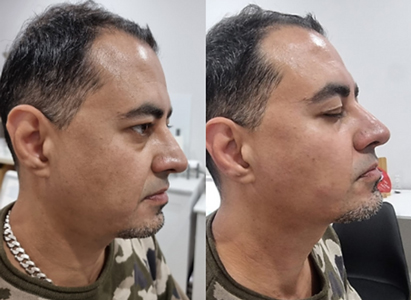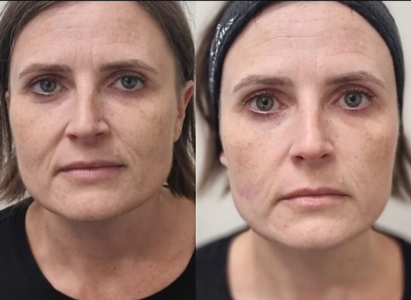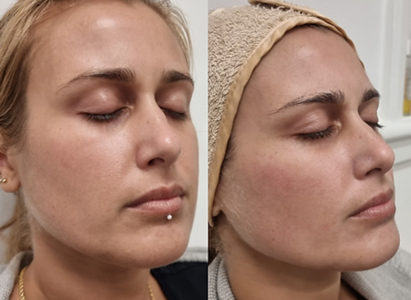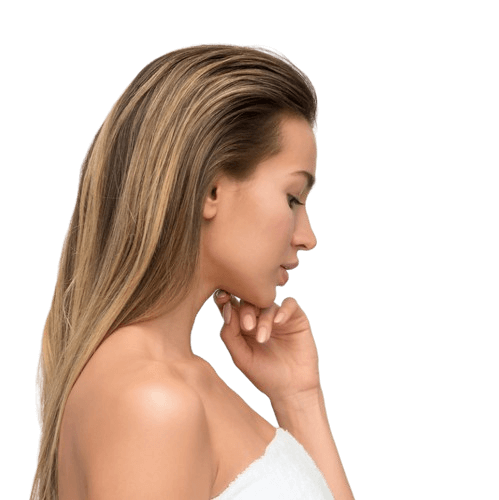
HIFU skin treatment
rejuvenate your skin.
What is HIFU?
As we age, the natural production of collagen in our skin decreases, leading to a loss of elasticity and the formation of wrinkles and fine lines. While lifestyle choices and skincare can help to slow the aging process, they cannot completely stop it.
At Purify, we offer a solution to help address the effects of aging with our HIFU treatment. Using high-intensity focused ultrasound technology, we can tighten and lift various areas of the face, this non-invasive treatment uses focused ultrasound energy to penetrate the skin, repairing damaged cells and triggering the formation of new collagen for a visibly tighter, lifted and rejuvenated appearance. With no downtime, it’s a luxurious and opulent way to achieve a youthful look.
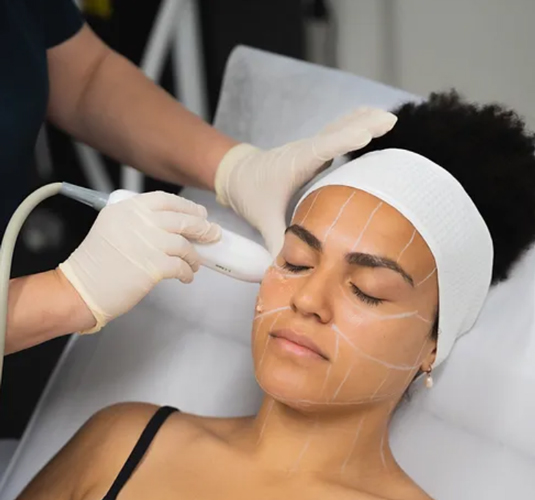
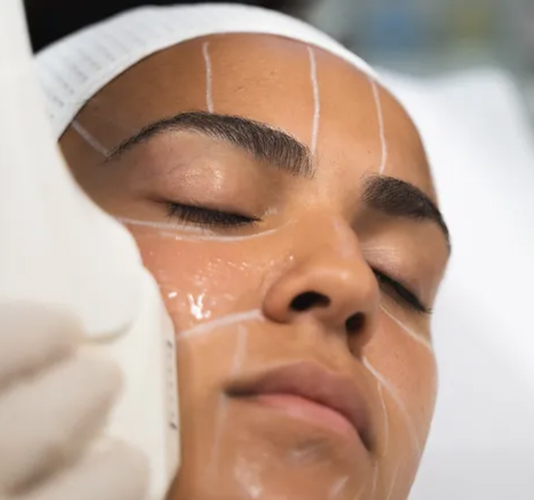
Why do HIFU?
One of reasons HIFU treatment is so popular is because it leverages on the body’s natural resources and there is no need for healing and recovery. It involves using ultrasound energy or laser beams to trigger the production of natural collagen in the body, this production of collagen makes the skin around the face tighter and more youthful. This means there is no need for surgery. It’s a non-invasive treatment compared to a face lift surgery that sculpts and lifts the face while improving lymphatic drainage, treats puffy eyes by reducing the fluid around the area improving circulation.
How does HIFU work?
Your skin therapist usually begins a HIFU facial rejuvenation by cleaning the chosen area of the face and applying a gel. Then, they use a handheld device that emits the ultrasound waves in short bursts.
Each session typically lasts 30–90 minutes. Some people report mild discomfort during the treatment, and some have pain afterward. You clinician may apply a local anesthetic before the procedure to help prevent this pain. When a session is over, there is also no recovery time which means that people can get on with their daily activities after receiving a HIFU treatment. People may require between one and six sessions, depending on the results they want to achieve.


How many HIFU treatments will I need to see results?
This is the next most asked question we get from clients. Our answer? One treatment, that’s it, just one HIFU treatment and you will see results. Given our clientele is unquestionably made up of vastly different ages, and of course with age the elasticity of the skin decreases. We have found that women over the age of thirty who have mild-moderate skin laxity will find that they experience the most results from one treatment. For those with more damaged skin or with a more severe skin laxity may require more treatments to see meaningful results.
What are the benefits of HIFU?
Here are the benefits of HIFU treatment:
- Reduces wrinkles or saggy skin
- Improves acne and acne scarring
- Defines and tightens skin
- Boosts cellular performance
- Glowing, rejuvenating and smoothing
- Reduces appearance of folds in the face (nasolabial folds)
- Cheaper alternative to surgery
- Non-invasive/non-surgical
- Quick downtime and recovery
- Eyebrow or cheek lift
- Can get rid of double chin
- Reduces heavy eyelids and under bags
When you combine all the above aesthetic benefits of HIFU it’s easy to understand why it’s quickly becoming a fixed favourite in the beauty industry for those that aren’t quite ready to go under the knife, or those who are showing preliminary, subtle signs of ageing and want to slow down, and even eliminate the process entirely.
Is HIFU treatment for me?
If you’re looking for a way to address wrinkles, fine lines, or sagging skin on your face or neck, the HIFU treatment offered at Purify is a great option. This non-surgical, non-invasive treatment uses high-intensity focused ultrasound technology to lift, tighten, and rejuvenate the skin. It’s also perfect for treating specific areas of the body and face, such as the neck and décolletage, as well as for post-pregnancy mothers or anyone with loose or crepey skin.
At Purify, we understand that not everyone wants to undergo surgery to achieve a more youthful appearance. That’s why we offer HIFU as an alternative to injectables or facelift surgery. With this treatment, you can achieve a facelift without needles or surgery, and you can return to your daily activities almost immediately after the treatment. So, if you’re looking to turn back time and achieve a more youthful appearance, HIFU may be the perfect solution for you.
Benefits of HIFU
HIFU preparation
Avoid sun exposure and sunless tanning. Sun burned or tanned skin will not be treated. All skin irritants must be stopped (glycolic/ salicylic acids, benzoyl peroxide, retinol products such as Retin A, Tazorac, Triluma, Differin, and Vitamin C) on the area being treated. Advise staff when taking antibiotics. Certain antibiotics (Tetracycline, Doxycycline) can make a patient photosensitive, therefore, treatment may not be able to done until two weeks after completion of antibiotic.
Day before treatment
Please let the staff know if you have a history of cold sores/fever blisters PRIOR to treatment, so an antiviral medication can be prescribed by your doctor (please arrange with your GP). Treatment can not be done if you have an active cold sore or skin infection and will be rescheduled.
Day of treatment
Do not wear any make-up or moisturisers on the area being treated, however, we have cleaners that can be used for you to remove in the clinic. If a patient chooses to use a topical numbing (anaesthetic) cream, please refer to the recommended product list below and purchase and apply 30 minutes prior to arrival.
Numbing cream you can purchase:
- EMLA 5% SKIN NUMBING CREAM
- NUMIT 5% SKIN NUMBING CREAM
This treatment is NOT suitable for:
- Pregnant or breastfeeding persons
- People with current or previous skin cancer (epithelioma and melanoma) or any benign/malignant tumours
- If you have impaired motor functions (paralysis of facial muscles), presence of metallic materials in bone/tissue in the area that is being treated, or infectious skin disease
- Those suffering from eczema in the area of treatment
- If you suffer from diabetes, epilepsy
- Those with a pacemaker
- Any concerns and skin conditions should be discussed over the phone before purchase.
- Suffer from bleeding disorders? Examples include the following:
- Acquired platelet function defects
- Congenital platelet function defects
- Disseminated intravascular coagulation (DIC)
- Prothrombin deficiency
- Factor V deficiency
- Factor VII deficiency
- Factor X deficiency
- Factor XI deficiency (haemophilia C)
Are undergoing anti-thrombosis therapy
- Have metal implants or permanent fillers in the treatment area
- Have an active systemic or skin disease that may hinder regeneration
- Have Autoimmune disease? Examples include the following: – Type 1 diabetes
- Rheumatoid arthritis (RA)
- Psoriasis/psoriatic arthritis
- Multiple sclerosis
- Systemic lupus erythematosus (SLE)
- Inflammatory bowel disease
- Addison’s disease
- Graves’ disease
FAQs about HIFU treatment
With HIFU we work on the different layers of the skin and what’s called the SMAS layer which sits under the skin. We pass through the skin at different depths addressing each level from 1 mm down to stimulate collagen down to 6 mm to be able to remove deep fat that can cause issues like a double chin. We have other settings that are in between and are able to help tighten the deep collagen fibres and the SMAS layer which consists of ligaments muscle and fascia. This is what sets HIFU apart the potential to treat at all these depths.
With our HIFU machine, you need two sessions 12 weeks apart. The results will then take between three to six months to fully come out but each day you will notice some improvement. We advise then having a maintenance treatment every 6 to 12 months to maintain an increase in the results.
HIFU works by using focused ultrasound waves to create heat, which can destroy targeted tissue. The ultrasound waves are directed at the target tissue through the skin, without the need for invasive surgery.
HIFU is generally well-tolerated by patients and is not considered to be a painful procedure. However, patients may experience discomfort during the procedure, and pain relief medication may be given if necessary.
The length of the HIFU procedure depends on the specific condition being treated and the size of the target tissue. In general, the procedure takes between one and three hours.
HIFU is generally considered to be a safe procedure, with few serious complications. However, as with any medical procedure, there are some risks, including skin burns, nerve damage, and bleeding.
The side effects of HIFU may include mild discomfort or pain during the procedure, as well as temporary swelling or bruising of the treated area. In some cases, patients may experience nausea, fatigue, or other mild symptoms after the procedure.
The recovery time from HIFU depends on the specific condition being treated and the size of the target tissue. In general, most patients are able to return to normal activities within a few days to a week after the procedure.
The effectiveness of HIFU depends on the specific medical condition being treated and the size of the target tissue. In general, HIFU has been shown to be effective in treating many medical conditions, and is often considered to be a good alternative to traditional surgery or radiation therapy.






